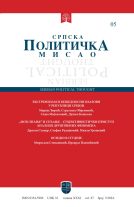- Home page
- Researchers
- Nenad Stekić
Nenad Stekić
Institute of International Politics and Economics, Belgrade

THE INTERPLAY OF DEMOCRACY AND TRADE: A COMPARATIVE STUDY OF CHINA AND THE EU IN EURASIAN RELATIONS
This paper investigates trade cooperation dynamics across the expansive Eurasian region, with a specific focus on the theoretical underpinnings of the democratic peace concept. It delves into the evolving trade and political relationships between 26 Eurasian countries and two prominent global actors – China and the European Union, spanning the period from 2007 to the Ukrainian crisis in 2022. Through an examination of statistical correlations between trade variables – namely, export and import – and factors such as free trade agreements, shifts in political regime types, institutional stability of Eurasian nations, and their membership within economic alliances, this research provides a nuanced perspective on the evolution of interactions between EU/China and Eurasia. The findings underscore a notable expansion in trade cooperation among the analysed cases since 2007, despite occasional tensions and divergent geopolitical interests involving China and the EU. Statistical analyses further reveal that the dynamics of export and import between the EU and Eurasian countries align with the stability of political regimes in Eurasia. Conversely, in the case of China, moderately negative correlations emerge. Importantly, trade patterns exhibit variations among individual countries, irrespective of their political regime dynamics, institutional stability, or membership in economic alliances – a phenomenon warranting in-depth exploration within the confines of this paper. The paper concludes by discussing how the findings challenge the postulates of commercial liberalism as part of democratic peace theory in the Eurasian context. The analysis clearly demonstrates that, with the EU and China as the two main global economic actors, these ideas need to be theoretically redefined to accurately capture the dynamics at play in the region in future.

Military Interventions As Omitted Variable Of Inversed Democratic Peace: An Empirical Evidence
The paper examines the relationship between military interventions and democratisation processes which took place in targeted states. While many researchers try to identify relationship between the regime type and countries’ war proneness, the authors of this paper put these two variables in a reversed order. To test this so-called “inversed democratic peace” thesis based on an argument that an ongoing war is likely to lead to democratisation, we focus our analysis on the US interventions in Afghanistan, Iraq, Libya, and FR Yugoslavia (Kosovo). We deploy three variables: 1) Foreign policy similarity, to determine whether the intervening actor (USA) had similar or different foreign policy goals at the beginning of interventions; 2) Political regime similarity, to indicate whether there were any deviations in the quality of political regime between the intervening state and the target country, as indicated by the democratic peace postulates; 3) military interventions (independent variable). Foreign policy score includes S score dataset developed by Curtis S. Signorino and Jeffrey M. Ritter (1999), while for the political regime quality, the authors deploy Polity IV data. Statistical analysis including Pearsonʼs correlation, logistic regression and descriptive statistics, will be presented for specific dyad level in three specifically designated models. The authors conclude that it is more likely that military interventions affect further democratisation of the targeted post-conflict societies, if observed in a short term rather than in longitudinal domain, while the foreign policy similarity (with the United States) positively correlates in cases with more successful democratisation process.

